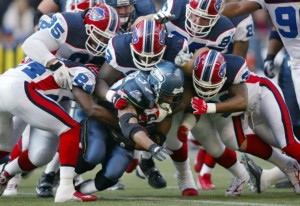As a native of Upstate New York, I am a de facto fan of the Buffalo Bills. Year after year, early season victories fall prey to lengthy losing streaks. The rest of the National Football League views Buffalo as a team too pitiful to succeed.
I attended this year’s game versus the St. Louis Rams on Dec. 9, 2012. Mathematically, the team was still in contention for the post-season. With a small lead going into the fourth quarter, the entire stadium could sense what was to follow: a game winning drive by the visiting team.
It was not the cold that left me disenchanted. Sure, I was frostbitten, but witnessing yet another collapse left me asking dangerous questions and proposing cynical solutions.
How can the team’s last playoff appearance be from the 1999 season? Many have speculated over the root cause of this phenomenon, citing poor quarterback play, perennial injuries, or poor personnel management. To them, I say yes. You are right. However, I do not think this accounts for enough of the hopelessness bearing down on the team. The often overlooked aspect I want to address is the debilitation of going to a losing, small market franchise in Buffalo.
Pretend you are a free agent. You get a call from two teams: the New England Patriots and the Buffalo Bills. One team has played in five Super Bowls in 12 years. The other can’t sell out its home games. For whom would you rather play?
Let’s pretend you end up choosing to uplift the hopeless franchise. Maybe they offer you the most money for your position in league history to play for them, which the Bills have done twice in six years (Derrick Dockery and Mario Williams). Your chinstrap is buckled, you take the field, but something is holding you back. You play on a team everyone expects to stink, and you buy into it.
Quarterback Drew Bledsoe, a Pro-Bowler who had led his former team to a Super Bowl appearance, was at the beginning of this sad saga for the Bills. In 2002 and 2003, the team went 8-8 and 6-10 respectively. For his third and final season, he entered the finale a win away from a playoff berth; instead, he lost to the second string of the post-season bound Pittsburgh Steelers, who were resting their starters. When it came time to follow through, he consistently came up short because the team should not and cannot win a big game.
Perhaps I was not clear about the debilitation factor of playing for a bad team. Pro-Bowlers Marcus Stroud, Terrell Owens, and Mario Williams had failed to live up to their hype after being signed by the Bills. Previous season statistics posit much more talent than what was shown here. What is worse, the phenomenon works both ways. Former draft picks Antoine Winfield, Nate Clements, Donte Witner, and Willis McGahee have had similar if not more success since leaving Buffalo early in their careers. Running back Marshawn Lynch went from above average in Buffalo to one of the league’s best in Seattle. I need not mention the numerous draft busts that further how a player cannot seem to reach peak performance for the Buffalo Bills. J.P Losman. John McCargo. Oops.
Are there exceptions to this rule? C.J. Spiller emerged this past season. Stevie Johnson has had back-to-back, 1,000-yard receiving seasons, a first in Bills history. The list is quite short. Mario Williams did have 10.5 sacks this season, yet three came in one game, and he failed to sack the quarterback in nine games. That is not the player that the team thought it brought in.
We can look toward revival efforts in similarly downtrodden franchises for a glimmer of hope amid the gloom of Upstate NY. The Cincinnati Bengals have made the playoffs two years in a row; the Detroit Lions went last year. Neither team won a post-season game. The Arizona Cardinals, of all franchises, went to a Super Bowl in Feb. 2009. They lost.
This isn’t limited to just the NFL. In the world of Major League Baseball, the Oakland A’s recently are allergic to playoff victories, the Chicago Cubs have not won a World Series since 1908, and the Kansas City Royals haven’t been to the playoffs in 27 years. Although these statistics make the Bills’ plight less embarrassing, the NFL has much more parity than the MLB.
I don’t have the answer to whether this debilitation factor comes from being surrounded by better talent elsewhere or suffocated by a lack thereof in Buffalo, although my instincts say it is neither. The stars that the Bills choose refuse to be stars when the chips are on the table. It is the player, not the uniform, that decides who wins and who loses.
What can the Buffalo Bills do to remedy this? I propose a couple of ideas.
First, the team has to get proven winners in charge at both head coach and quarterback. The Bills previous three head coaches, Mike Mularkey, Dick Jauron, and Chan Gailey have a combined zero playoff wins. Get a quarterback that demands the respect of his teammates, a guy who can make a play when the game is on the line. These players are few and far between, but instead of looking for superior athleticism or NFL combine talent, get a guy who delivers victories.
Second, execute. Bring in players who get the job done. Please prove to me that it is not some Buffalo curse. This is a franchise that made it to four straight Super Bowls in the early 1990s.
They lost them all, though.
Brady is a member of the class of 2015.


